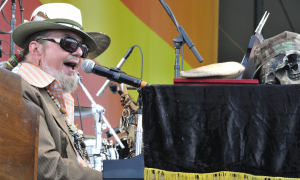Home » Jazz Articles » Jazzmatazz » Remembering Walter Becker
Remembering Walter Becker

This past Sunday one of the two architects of pioneering jazz-rock group Steely Dan, Walter Becker, died at the age of 67.
Steely Dan
band / ensemble / orchestrab.1972

Walter Becker
guitar1950 - 2017
Becker co-wrote all of the bands material with lead singer

Donald Fagen
piano and vocalsb.1948

Dean Parks
guitar
Larry Carlton
guitarb.1948

Chuck Rainey
bass, electricb.1940
Becker and Fagen took a more journalistic approach, writing songs based on stories and made up characters. If anyone thinks pop songs cannot be poetry listen to "Deacon Blues," off the 1977 album Aja. The song is about a suburban man desperately trying to escape his mundane existence by embracing the world of jazz saxophone. As someone from the suburbs myself, I have always had sympathy for the character. As Becker said in an interview with The Wall Street Journal, "It's not so much about a guy who achieves his dream but about a broken dream of a broken man living a broken life." A standout line from "Deacon Blues" is "I cried when I wrote this song. Sue me if I play too long." it's a jab at the self-important jazz musician, who feels that because of the "emotion" he puts into his music that he can ramble on for as long as he wants to. Becker said in an Eagle Rock documentary on the making of the the album that, "the protagonist is not a musician: that's just one of the mythic forms of loserdom to which he might aspire." An important part of the musician's mythos is that of the free spirited maverick who eschews convention. However, Fagen's delivery of the line isn't mocking, it's earnest, bringing a sense a grander to the mid-life crisis. In Fagen said the song is "as close to autobiography as our tunes get." Perhaps Fagen and Becker recognized that if things in their own lives turned out differently that they could have been the ones trying to "cross that fine line."
The famous introduction features a chord that Steely Dan introduced to rock audiences the "add two chord." The chord, nicknamed the "Mu Major" is a major chord with an added second. In "Deacon Blues," the keyboard voicing also has the third in the bass. The use of the third in the bass, instead of the root, creates a chromatic descending bass line before the band settles on the E7#9.
The band was a who's who of session musicians with

Victor Feldman
multi-instrumentalist1934 - 1987

Larry Carlton
guitarb.1948

Lee Ritenour
guitarb.1952

Bernard Purdie
drumsb.1939

Pete Christlieb
saxophoneb.1945
Walter brought the edge. There's a harsh desolation to his solo albums. The song "Bob Is Not Your Uncle Anymore," off his second and final solo album Circus Money, is a prime example of his solo sound. Instrumentally the song is heavily influenced by reggae, built around the interplay between Becker bass line, and drummer

Keith Carlock
drumsPhoto credit: C. Andrew Hovan
Tags
Jazzmatazz
Walter Becker
Matthew Hooke
steely dan
Donald Fagen
Dean Parks
Larry Carlton
Chuck Rainey
Victor Feldman
Lee Ritenour
Bernard Purdie
Pete Christlieb
Keith Carlock
Comments
PREVIOUS / NEXT
Support All About Jazz
 All About Jazz has been a pillar of jazz since 1995, championing it as an art form and, more importantly, supporting the musicians who make it. Our enduring commitment has made "AAJ" one of the most culturally important websites of its kind, read by hundreds of thousands of fans, musicians and industry figures every month.
All About Jazz has been a pillar of jazz since 1995, championing it as an art form and, more importantly, supporting the musicians who make it. Our enduring commitment has made "AAJ" one of the most culturally important websites of its kind, read by hundreds of thousands of fans, musicians and industry figures every month.






 Buy Now
Buy Now























